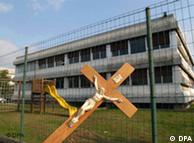Religion | 03.11.2009
Human rights court: no crosses in classrooms
The European Court of Human Rights in Strasbourg ruled Tuesday that the presence of crucifixes in Italian public school classrooms conflicts with the rights of non-Christians.
The case was brought by Finnish-born Italian citizen Soile Lautsi, who asked the school authorities in the Italian town of Abano Terme to remove the crosses from the classrooms which her 11- and 13-year-old daughters attended. She justified her request with a decision by an Italian appeal court, which found that the presence of crosses in polling stations ran counter to the Italian state's religious neutrality.
However, the Italian courts agreed with the state authorities that the cross was not a religious symbol but a symbol of the identity and history of the country.
Freedom not to belong
Now, the European Court has said that a child may well see the crucifix as a religious symbol. The freedom not to belong to a religion was also part of religious freedom and required special protection, said the judges. They awarded the plaintiff 5,000 euros ($7,338) in damages.
The decision has caused a storm of protest in Italy across party lines. The foreign minister, Franco Frattini, said the court had dealt a "mortal blow to a Europe of values and rights."
Paola Binetti of the opposition Democratic Party - formerly communists - said, "In Italy, the crucifix is a specific sign of our tradition."
The government said it would appeal.
Vatican: "wrong and myopic"
The Italian Catholic bishops' conference also attacked the ruling, saying that the judges' decision was "partisan and ideological."
After initial caution, the Vatican joined the critics. "The ruling of the European court was received in the Vatican with shock and sadness," said Vatican spokesman Father Federico Lombardi. "It is wrong and myopic to try to exclude [the crucifix] from the world of education."
The case is similar to one brought in 1995 by a parent in the German state of Bavaria, in which the German constitutional court decided that it was against religious freedom for the Bavarian state to impose crucifixes in public school classrooms. The state parliament responded with a law requiring the removal of crucifixes, but only if a parent insisted.
The Bavarian minister responsible for religious affairs, Ludwig Spaerle, said that Bavarian practice was in accordance with the new decision.
mll/epd/KNA/Reuters/AFP/AP
Editor: Nancy Isenson


No comments:
Post a Comment